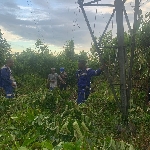OPDAG calls for urgent action to stop smuggling of illegal vegetable oil into Ghana
 Paul Kwabena Amaning
Paul Kwabena Amaning
The Oil Palm Development Association of Ghana (OPDAG) is calling on the government to take swift and decisive measures to curb the smuggling of illegal vegetable cooking oil into the country, warning that the situation poses both serious health risks and economic threats to the nation.
According to Paul Kwabena Amaning, President of OPDAG, the influx of unregulated and substandard vegetable oils into the Ghanaian market is undermining the local palm oil industry and threatening the livelihoods of more than 1.2 million people who depend on the sector.
“Smuggling of vegetable oil not only endangers public health but also threatens the survival of local producers who are working hard to grow the industry,” Amaning stated.
Ghana currently cultivates approximately 300,000 hectares of land for oil palm, yielding around 300,000 metric tonnes of crude palm oil each year. However, national demand stands at about 400,000 metric tonnes, leaving a deficit of 100,000 metric tonnes annually.
This shortfall, OPDAG explained, has created a market gap that smugglers are exploiting by bringing in illegal, low-quality oils, many of which do not meet health and safety standards.
“If these illegal activities continue unchecked, local industries could collapse, thousands of jobs could be lost, and the country’s economy would suffer greatly,” the association cautioned.
OPDAG is urging government agencies to strengthen border surveillance and ensure better coordination among regulatory bodies, including the Food and Drugs Authority (FDA), the Ghana Standards Authority (GSA), and the Customs Division of the Ghana Revenue Authority (GRA).
The Association also called for strict enforcement of certification and traceability systems to ensure that only safe, quality-assured vegetable oils are sold on the market.
“We are appealing to the government to equip enforcement agencies with the necessary logistics to combat this smuggling menace,” OPDAG said in a statement.
OPDAG further appealed to the media to use their platforms to educate the public on the dangers of consuming unapproved oils and to help expose illegal trade networks.
It also warned that anyone caught smuggling or distributing unlicensed vegetable oil would face prosecution to serve as a deterrent to others.
The Association emphasised that supporting local oil palm production would not only protect jobs but also enhance Ghana’s economic resilience and reduce dependence on imports.
“By promoting certified, locally produced oils, Ghana can create sustainable employment, grow its industrial base, and ensure that consumers have access to safe and quality products,” Amaning added.
OPDAG reaffirmed its commitment to collaborating with the government, regulatory agencies, and industry stakeholders to ensure the growth and long-term sustainability of Ghana’s oil palm sector.
Source: Classfmonline.com/Cecil Mensah
Trending Business

It took NLA 9 years to generate GHS 3.065 billion -Razak Kojo Opoku to Fourth Estate
10:49
Mozambique studies Ghana’s Goldbod model amid gold market reforms
03:53
Energy Minister commends BOSTEnergies for strategic reforms and commitment to fuel security
03:16
OPDAG calls for urgent action to stop smuggling of illegal vegetable oil into Ghana
17:52
Damaged 161kV Aboadze–Tarkwa transmission line under repair-Energy Ministry
03:09
GRIDCo and ECG announce planned power interruption in Central Region on October 24
17:41
Cashew farmers urge gov't to intervene to save industry
18:01
Prudential Bank staff stage sit-down protest over unfair salary adjustments
11:53
Ghana needs strong gov't support to boost rice production — IFS
15:57
Ghana’s economy ‘so far so excellent’ - Majority Leader touts strong gains
11:01




